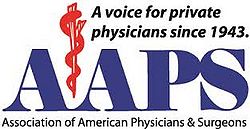Association Of American Physicians And Surgeons
 From Conservapedia
From Conservapedia The Association of American Physicians and Surgeons (AAPS)[1] is the oldest active conservative and libertarian group in the world. Founded in 1943, AAPS is a membership-based physician organization that does not accept funding by corporations or government, thereby ensuring AAPS's independence and nonpartisanship.
The AAPS may be the largest physician organization funded virtually entirely by membership dues. Rival organizations, such as the liberal-leaning American Medical Association (which endorses ObamaCare and gun control), are funded primarily by revenue from business ventures and payments by pharmaceutical companies.
For more than 75 years AAPS has remained dedicated to the preservation of the ethical practice of private medicine. It adheres to the Oath of Hippocrates. The motto of AAPS is "omnia pro aegroto," which is Latin for "all for the patient." AAPS has about 4,000 members, including members in every state and virtually every specialty of medicine. Dr. Jane Orient, M.D is the Executive Director of AAPS.
Contents
Legal Activity of Association of American Physicians and Surgeons[edit]
AAPS files more legal briefs on behalf of physicians and their patients than most medical societies combined, and is often successful. In 2008, four Supreme Court Justices cited AAPS's brief in the key Second Amendment decision of D.C. v. Heller. In 2006, the Court of Appeals for the Third Circuit sided with AAPS and cited its amicus curiae brief in the first paragraph of the decision. Springer v. Henry, 435 F.3d 268, 271 (3d Cir. 2006). Later in 2006, the Court of Appeals for the Fourth Circuit agreed with an argument advanced by AAPS in its amicus curiae brief in overturning a highly publicized conviction and 25-year sentence of Dr. William Hurwitz for treating pain in his patients.
In Stenberg v. Carhart, 530 U.S. 914 (2000), U.S. Supreme Court Justice Kennedy frequently cited material provided in a submission by AAPS. In United States v. Rutgard, 116 F.3d 1270 (9th Cir. 1997), the Court of Appeals for the Ninth Circuit reversed a lengthy sentence as urged by an amicus curiae brief submitted by AAPS. In Veeck v. Southern Building Code Congress Int'l, Inc., 293 F.3d 791 (5th Cir. 2002), the en banc Court of Appeals for the Fifth Court adopted an argument urged by AAPS in establishing that no one may own the law.
Additional court decisions in cases brought by AAPS or citing its work include:
- Ass’n of Am. Physicians & Surgs. v. Mathews, 423 U.S. 975 (1975).
- Ass’n of Am. Physicians & Surgs. v. Tex. Med. Bd., 627 F.3d 547 (5th Cir. 2010).
- Ass’n of Am. Physicians & Surgs. v. Clinton, 997 F.2d 898 (D.C. Cir. 1993)
- United States v. Natale, 719 F.3d 719 (7th Cir. 2013).
- Springer v. Henry, 435 F.3d 268 (3d Cir. 2006).
Policy Issues[edit]

AAPS has also been successful on issues of policy. It reviewed the approval data for Wyeth's rotavirus vaccine and declared it to be unsafe before the FDA ultimately came to the same conclusion and pulled it from the market. AAPS is the only entity to have defeated the FDA twice in litigation, in both cases establishing limits on its power.
More recently, AAPS spoke out against the mandate for the HPV vaccine, as it opposes all mandatory vaccines.[4] Subsequently, the Texas Medical Association and a broad coalition of organizations also opposed this mandate. In July 2007, Congressman Phil Gingrey cited AAPS on the floor of Congress in support of an amendment subsequently passed by the House of Representatives:[5]
- Mr. Chairman, my amendment would serve as an incentive for states to keep HPV vaccination programs voluntary, not mandatory. ...
- Excluding children from public school for refusal to be vaccinated for a disease spread only by sexual intercourse is a serious, precedent-setting action that trespasses on the right of parents to make medical decisions for their children, as well as on the rights of the children to attend school.
- A mandatory HPV vaccine program improperly and unnecessarily inserts the government into the lives of children, parents, and physicians. In fact, the American College of Pediatricians and the Association of American Physicians and Surgeons are opposed to any legislation which would require HPV vaccination for school attendance.
Medical journal of the Association of American Physicians and Surgeons[edit]
See also: Journal of Association of American Physicians and Surgeons
The AAPS publishes the peer reviewed medical journal Journal of American Physicians and Surgeons (JPandS). The journal has been published since 2003. The JPandS was formerly the Medical Sentinel.[6]
See also[edit]
- Association of American Physicians and Surgeons website
- Association of American Physicians and Surgeons - PAC
- AAPS v. Weinberger
- American Medical Association
- American Psychiatric Association
- American Psychological Association
- Physicians for Patient Protection
External links[edit]
Articles and resources on AAPS:
References[edit]
Categories: [Conservative Organizations] [Nonprofits] [Association of American Physicians and Surgeons] [Medical Associations] [Pro Second Amendment]
↧ Download as ZWI file | Last modified: 03/08/2023 01:28:15 | 83 views
☰ Source: https://www.conservapedia.com/Association_of_American_Physicians_and_Surgeons | License: CC BY-SA 3.0
 ZWI signed:
ZWI signed:
 KSF
KSF